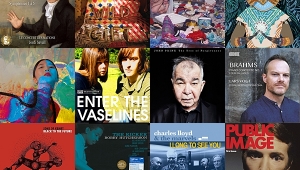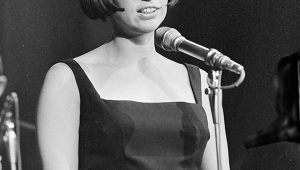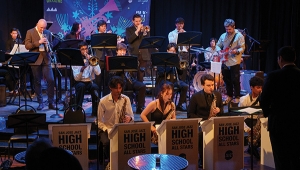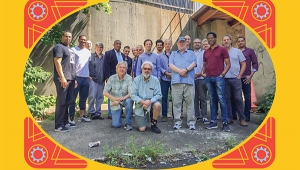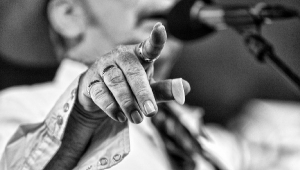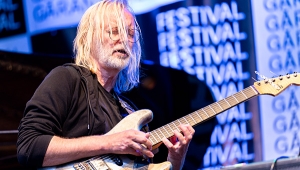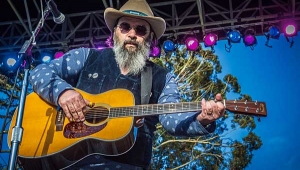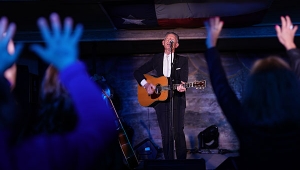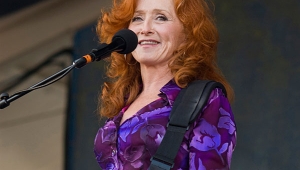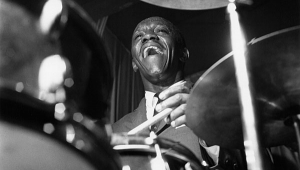| Columns Retired Columns & Blogs |
Frank Zappa on CD (and LP), Part I-III Part 3, Page 1
ZAPPALANCHE! (Frank Zappa, Part III)
Stereophile Vol.12 No.1, January 1989
Stereophile Vol.12 No.1, January 1989
You Can't Do That On Stage Anymore, Vol.1 Ryko RCD 10081, 10082 (2 CDs only). ADD, DDD. TT: 137:39
You Can't Do That On Stage Anymore, Vol.2: The Helsinki Concert Ryko RCD 10083, 10084 (2 CDs). ADD. TT: 116:58 Barking Pumpkin D1 74217 (3 LPs). ADA. TT: 106:06
You Can't Do That On Stage Anymore, Sampler Barking Pumpkin D1 74213 (2 LPs only). ADA, DDA. TT: 81:40
Guitar Ryko RCD 10079, 10080 (2 CDs). ADD, DDD. TT: 132:20 Barking Pumpkin D1 74212 (2 LPs). ADA, DDA. TT: 80:58
Does Humor Belong In Music? EMI CDP 7 46188 2 (import CD only). DDD. TT: 60:46
Broadway the Hard Way Barking Pumpkin D1 74218 (LP only). DDA. TT: 39:23
All above: Bob Stone, eng.; Frank Zappa, prod.
Did you know that once upon a time, way back a long time ago, before the Big Bang, there was this portly maroon sofa? That an infinite (well, from Belfast to Bognor Regis, anyway) expanse of oak flooring came next, followed by a chrome dinette set? That the Big G, whenever He gets down to some serious creating, speaks German? My, but there's a lot to learn.
But so it is taught in the Gospel According to Frank Zappa which begins Vol.1 of You Can't Do That On Stage Anymore (YCDTOSA). This long-awaited series of six live double-CD sets, all of which should be available by the end of 1989, is unprecedented in the history of releases by living rock, pop, or jazz artists; Keith Jarrett's 10-LP Sun Bear Concerts pales by comparison. Self-indulgent? So far, an emphatic "No." As a regular attendee at Zappa fetes, I've always been astounded at the overabundance of near-genius material presented, and invariably disappointed at how little of that music ever made it onto records (even with Zappa releasing twice as many discs as any other rock musician). That imbalance seems finally to be righted by the Zappalanche of CDs and LPs under review here.
The fact is that Zappa's bands simply play better than any eight other rock/fusion bands you could name, a fact that is finally becoming more widely known. The problem FZ's unclassifiable music has always faced is that, rock-based as it is, the vast majority of its bread-and-butter audience of rock fans, dedicated as they are, know no musical languages outside of rock, finding most of the rest of what he's doing sailing high over their heads. I can't tell you how many times, in conversation with gleeful Zappa fans, I've discovered that what I hear as his most rigorous, strictly organized, through-composed work is heard by most of his own fans as chaotic, freak-out, free blowing. As FZ himself said in disgust, and in partial explanation of the breakup of the original Mothers of Invention in 1969, "These kids wouldn't recognize real music if it came up and bit 'em on the ass."
As far as critical commentary goes, look: No one who isn't a pretty serious Zappaphile already is going to take a chance, on my say-so or no, on dropping $34 on one of these three sets, or $20 on the import-only Humor CD. And if I wasn't getting these gratis, I'd have to do some serious budgeting to be able to afford everything Zappa's released and re-released just this year alone. Zappa releases more records in a year than many listeners buy. Suffice it to say that all of this music is played by rock bands that are probably better players, together and separately, than anyone else in the studio or on the road; regardless of what you think of Zappa's music---not to mention his lyrics---you can be assured of hearing some of the best, most exhilarating playing ever. Just a general note in advance, then: The two YCDTOSA volumes are important, necessary additions for anyone who's bought more than one FZ album in the last 15 years; others might try the sampler, which excerpts from the entire series. Guitar is for more rarefied tastes, primarily guitar players; it lacks some of the variety of its predecessor, Shut Up 'n' Play Yer Guitar, so be cautious; again, there's an LP sampler for less than half the price. Humor and Broadway are souvenirs of the '84 and '88 tours, respectively; attendees will know what to expect. All others: Humor emphasizes instrumental music, Broadway is composed entirely of entertaining political polemics. Take yer choice. For the hard-core: I rest my case, you've got 'em already. Just keep in mind that everything reviewed in this month's survey is new material: no reissues of back catalog here.
In the YCDTOSA series, as FZ takes some pains to point out in the liner notes, there are no overdubs (he's notorious for 'em), all material is previously unreleased, and the entire collection is determinedly not chronological. For example: Disc 1 begins with "Once Upon A Time" and "Sofa #2" from 1971, segues into a 1982 "The Mammy Anthem," then takes a baby step back to a 1980 early digital (PCM 1600 direct-to-two-track) "You Didn't Try To Call Me." Then, after a rundown of the band's diseases ca 1979 (24-track analog), it's way back to the 1969 Mothers via 7 1/2ips 2-track analog. This goes on for 2 1/4 hours. It's a hell of a lot more enjoyable to listen to in that order than to write about; I've unscrambled Vol.1 for you---we'll take it year by year.
Those original Mothers are represented by four tracks: a medley of "Let's Make the Water Turn Black," "Harry You're a Beast," and "Orange County Lumber Truck," plus "Plastic People," "Sweet Leilani," and "Oh No." "Leilani" sums up much of what was so attractive about this group of mostly musical illiterates---it's the sort of junk Hawaiian love-song in the deliberately sleazy style that only this group seemed able to pull off. It's often been said that you have to be an excellent musician to play with this kind of inspired awfulness, but sometimes it helps to actually be that bad. I've gotta say that I've never heard lounge-lizard tenor sax played better than by Bunk Gardner. The rest is of primarily archival value, although "Oh No" 's out-chorus of horn noodling is interesting.
The '71 Turtles band---so-called because three of its members were from that now legendary group---contributes another four tracks, only one of them a "song" per se, but including an almost entirely different variation on Live at the Fillmore's "What Kind of Girl Do You Think We Are?", here called "The Groupie Routine." This X-rated dialogue is the sort of thing FZ feels you can't do on stage anymore. Tasteless? You bet. And so much fun! Another age might have called this a "party record." (Remember the Hot Nuts?) Oh, yes---this band performs the FZ rewrite of Genesis that began this article.
The '73/'74 band (one of his best; see YCDTOSA II, below) sings the previously unreleased "Babbette" (a '50s love-ballad to a poodle), and "Ruthie-Ruthie," yet another retread of "Louie Louie," which FZ has managed to reference on virtually every one of his 60-odd records. But there's more substantial music as well: the big-band chart of "Big Swifty" gets a brisk, sped-through rearrangement; thick, dense music, meatily played. The '77 band, which included Adrian Belew, Patrick O'Hearn, and Terry Bozzio, takes "The Torture Never Stops" out for a 15-minute spin (primarily a guitar vehicle), and the '79 Sheik Yerbouti band's 20-minute "Don't Eat the Yellow Snow" extravaganza is a breakneck reading of the Apostrophe suite, with lots of audience participation (including a drunken poetry reading, accompanied by the band, by one Angus O'Patrick O'Reilly McGinty), FZ's algebraic riffs piled thick and fast, fast, fast, and an entirely new closing section reminiscent of the choral recitatives of 200 Motels.
The '80 band delivers a mock-heroic "You Didn't Try To Call Me," and the '81 lineup plays a suite from one of FZ's less listenable albums, You Are What You Is. "Dumb All Over," "Heavenly Bank Account," and "Suicide Chump," all attacks on the retrograde religious right, are far superior here to their horribly overproduced studio cousins. Zappa stops the action to stentorianly intone "Tax the churches! Tax the businesses owned by the churches!" Amen. There's also a great Michael Brecker-style sax solo by Bobby Martin on "Suicide."
Most of the rest of the selections, from the '82 and '84 tours, add less to their originals, with the exception of "The Deathless Horsie," one of the most densely musical guitar solos FZ has ever written or performed. This is a more thickly textured version than the one found on Shut Up 'n' Play Yer Guitar. (Axemen: other substantial FZ guitar solos are found on "Big Swifty," "Zomby Woof,"and "Torture"; "Tell Me You Love Me" has some screaming fills.)
YCDTOSA Vol.2 is a complete two-hour concert from Helsinki, Finland, in 1974, with Napoleon Murphy Brock on vocals and sax, George Duke on keyboards, Ruth Underwood on percussion, Tom Fowler on bass, and Chester Thompson (who later went on to Weather Report) on drums. This and the Turtles band get my votes for Most Enjoyable of all the Zappa bands, probably because they most obviously had the best time on stage. (FZ's more recent bands might play a bit better, but there's more of a hired-hand feel, more anonymous virtuosity. Their predecessors were bands.) The sound lacks something in clarity, but has a warm, round, healthy, straightforward texture that I associate with their gusto in attacking and humanizing Zappa's often clinical arrangements.
After a preview (five years in advance) of "A Token of My Extreme" from Joe's Garage, here called "Tush Tush Tush," we come to "Stinkfoot," with some of Zappa's best slash-and-burn guitar. The "Inca Roads" guitar solo is nearly identical to that of the studio version on One Size Fits All, and might well be the same one; a note on OSFA tells us that that solo was recorded in Finland. There immediately follows what I'd hoped would be a treat---"RDNZL," as close as we'll get for a while to the great Studio Tan version until that's re-released on Lather next year. Or the next. Half of this one is guitar solo, there are some incomprehensible lyrics, and George Duke's---probably the single best player ever to grace a Zappa band---crazed piano solo.
- Log in or register to post comments
